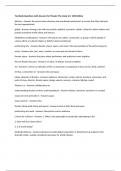Test Bank Questions with Answers for Theatre The Lively Art. 10th Edition
director - Answers the person who rehearses and coordinates performers to ensure that they interpret
the text appropriately
global - Answers having to do with any activity- political, economic, artistic, cultural-in which nations and
people around the world relate and interact
Multiethnic/multicultural - Answers referring to any nation, community, or group in which people of
various ethnic or cultural origins or beliefs coexist and interact
preforming arts - Answers theatre, dance, opera, and music. Film also partakes of the performing arts.
script - Answers also, text, story, incident, or event put into theatrical form.
theatre space - Answers the place where performers and audiences come together
We see theatre because - Answers it is alive, its history, human condition
Art - Answers a mirror or reflection of life: an extension or projection of how we live, think, and feel
Art has a connection to - Answers time and space
Major elements of theatre - Answers Audience, Performers, Script, with its structure, characters, and
point of view, director, theatre space, design aspects: scenery, costume, lighting, sound
Theatre is a - Answers collaborative art
understanding theatre involves understanding its - Answers history, elements, and how it is created
visual arts exist primarily in - Answers space
music exists in - Answers time
theatre (along with dance and opera) - Answers exists in both time and space
performing arts need - Answers interpreters and an audience
Criteria for Criticism - Answers 1. What is the playwright or production attempting to do?
2. How well has it been done?
3. Is it worth doing?
Aesthetic Distance - Answers physical or psychological separation or detachment of audience from
dramatic action, usually considered necessary for artistic illusion
, Auteur Director - Answers A director who believes that his or her role is to be the author of a
production. An auteur director's point of view dominates that of the playwright, and the director may
make textual changes and modifications.
reviewer - Answers a type of critic who reports on a production and gives a brief opinion about whether
or not it is worth seeing
critic - Answers an individual who writes and/or publishes a review of a film from either an artistic or
entertainment point of view
Descriptive - Answers explaining what is actually on stage
prescriptive - Answers offer advice on what should take place
six aspects of script - Answers 1.selecting the specific subject of the play
2. determining focus
3. establishing purpose
4. developing dramatic structure
5. creating dramatic characters
6. establishing point of view
Essentials of Dramatic Structure - Answers plot, action, conflict, opposed forces, balance of forces
action - Answers central, unifying conflict and movement through a drama
Antagonist - Answers A character or force in conflict with the main character
Chorus - Answers A group of characters in Greek tragedy (and in later forms of drama), who
sang/danced/comment on the action of a play sometimes participating
climatic structure - Answers Also referred to as intensive structure. Dramatic structure in which there
are few scenes, a short time passes, there are few locales, and the action begins chronologically close to
the climax.
Climax - Answers high point of the story
Commedia dell'arte - Answers dialogue improvised around a loose scenario
complication - Answers Introduction, in a play, of a new force that creates a new balance of power and
entails a delay in reaching the climax.
Conflict - Answers tension between two or more characters




